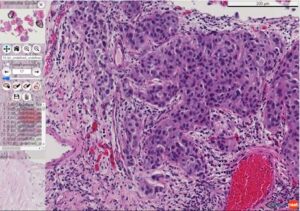Bladder cancer is a complex chapter of pathology, where the subjectivity of the interpretation of some difficult cases has to take in account to achieve a diagnosis. It has to take in account that the expertise is definitely the best accurate way to make a good diagnosis. But with the help of AI It can do a lot better.
Course in Bladder cancer pathology: In this virtual course, we had to review some of the bladder whole slide images database to make annotations and see them with the uropathologist of the bladder cancer group of EMC.
In order to make this annotations and to really take advantage of this course you had to study before the histopathological features of the bladder tumor lesions. The uropathologist of the bladder cancer group has always the best attitude and explains complex subject in a very easy and friendly way.
Weekly lab meetings: In these meetings, they present all the advances from their research studies. I found really interesting that in some researches they expose the use or organoids that can help to understand some of the molecular alterations in different types of tumors. Also they expose very interesting scientific papers regarding artificial intelligence applied to bladder histopathology.
Fig 1. Example of a high-grade invasive urothelial papillary carcinoma. EMC virtual secondment.
Andrés Mosquera-Zamudio – ESR12


